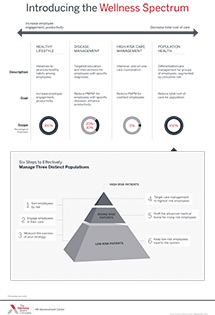Auto logout in seconds.
Continue LogoutEditor's note: This popular story from the Daily Briefing's archives was republished on Feb. 26, 2019
A growing number of trade groups are funding research to market their products as "superfoods," but the term is "nutritionally meaningless," Marion Nestle, an author and professor in the department of nutrition, food studies, and public health at New York University, writes for The Atlantic.
Help your employees promote healthy habits—regardless of the newest diet fads
Nestle argues, "To ask whether one single food has special health benefits defies common sense. We do not eat just one food. We eat many different foods in combinations that differ from day to day; varying our food intake takes care of nutrient needs." That doesn't mean that all foods are equally healthy, but it does mean that most formal nutrition guidelines incorporate a wide range of foods: "diets that are largely plant-based, meaning those that include plenty of fruits, vegetables, grains, beans, and nuts."
So why then, Nestle asks, "would the producers of foods such as cranberries, pears, avocados, or walnuts fund research aimed at proving that these particular foods—rather than fruits, vegetables, or nuts in general—have special health benefits?"
Her answer: "Marketing, of course."
How blueberries became a 'superfood'
In 1992, the Maine Wild Blueberry Commission began consulting with marketing specialists to better distinguish wild blueberries from cultivated blueberries and increase sales, Nestle writes.
One of these specialists read an article in a USDA magazine indicating that antioxidants found in plants were useful for "boosting the immune system, reducing inflammation and allergies, [and] detoxifying contaminants and pollutants." What's more, the article said, blueberries had the highest antioxidant levels of any tested fruit.
That consultant advised the commission to focus its advertising on the antioxidants found in blueberries, and from 1997 to 2000 half of the commission's marketing resources went toward making blueberries the "superfood" of antioxidants, Nestle writes.
The trade association Wild Blueberries of North America also touts the health benefits of blueberries—specifically frozen wild blueberries, rather than unfrozen supermarket blueberries—saying that the fruit is "[j]am-packed with a variety of natural phytochemicals such as anthocyanin" and that they have "twice the antioxidant capacity per serving of regular blueberries." Not only that, the trade association said, but "[a] growing body of research is establishing wild blueberries as a potential ally to protect against diseases such as cancer, heart disease, diabetes, and Alzheimer's."
'A fruit like any other'
Despite these over-the-top claims, blueberries are "just a fruit like any other," Nestle writes. "Their antioxidants may counteract the damaging actions of oxidizing agents (free radicals) in the body, but studies of how well antioxidants protect against disease yield results that are annoyingly inconsistent," Generally, she explains these studies have found that antioxidant supplements don't reduce disease risk, and some have even shown them to carry potential risks.
In fact, USDA has stopped publishing data on food antioxidant levels, citing "mounting evidence that the values indicating antioxidant capacity have no relevance to the effects of specific bioactive compounds, including polyphenols on human health." Similarly, NIH's National Center for Complementary and Integrative Health has said antioxidants have no special benefits. "People who eat more fruits and vegetables have less risk of chronic disease, but nobody really knows whether this is because of antioxidants, other food components, or other lifestyle choices," Nestle writes.
Nutritional research aimed specifically at marketing "skew[s] the research agenda," Nestle writes. "If food companies were not funding marketing studies, investigators might be working on more important biological problems."
All of these foods are worth eating, but whether one is better than the other depends on a number of factors, Nestle writes. "All fruits, vegetables, and nuts have vitamins, minerals, fiber, antioxidants, and other components that collectively promote health. If we are fortunate enough to have choices, we can eat the ones we like" (Nestle, The Atlantic, 10/23).
Help your employees promote healthy habits—regardless of the newest diet fads
Programs aimed at promoting healthy habits among employees are likely to lead to improved employee engagement and productivity—but they're unlikely to reduce the total cost of care. To do that, you'll need to take a population health approach.
Don't miss out on the latest Advisory Board insights
Create your free account to access 1 resource, including the latest research and webinars.
Want access without creating an account?
You have 1 free members-only resource remaining this month.
1 free members-only resources remaining
1 free members-only resources remaining
You've reached your limit of free insights
Become a member to access all of Advisory Board's resources, events, and experts
Never miss out on the latest innovative health care content tailored to you.
Benefits include:
You've reached your limit of free insights
Become a member to access all of Advisory Board's resources, events, and experts
Never miss out on the latest innovative health care content tailored to you.
Benefits include:
This content is available through your Curated Research partnership with Advisory Board. Click on ‘view this resource’ to read the full piece
Email ask@advisory.com to learn more
Click on ‘Become a Member’ to learn about the benefits of a Full-Access partnership with Advisory Board
Never miss out on the latest innovative health care content tailored to you.
Benefits Include:
This is for members only. Learn more.
Click on ‘Become a Member’ to learn about the benefits of a Full-Access partnership with Advisory Board
Never miss out on the latest innovative health care content tailored to you.

